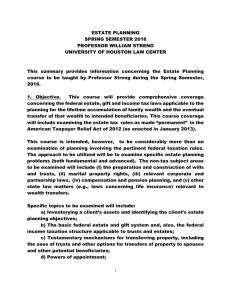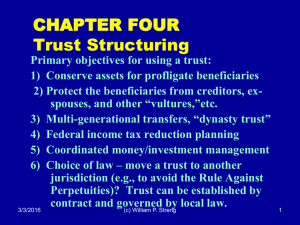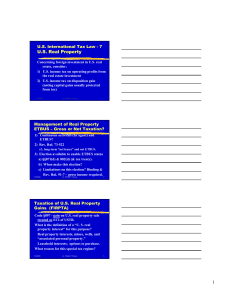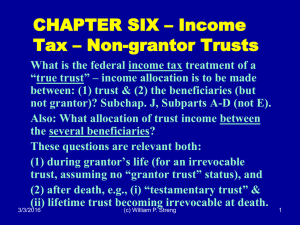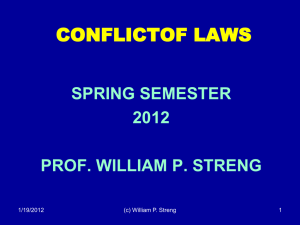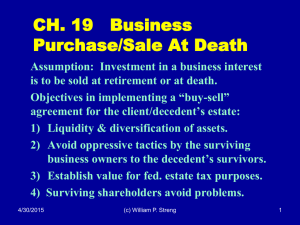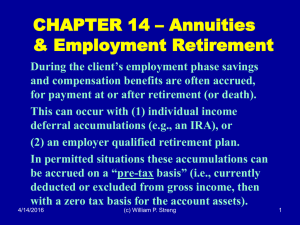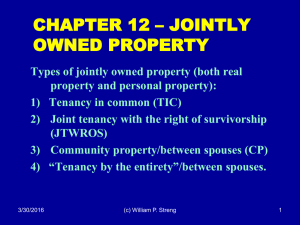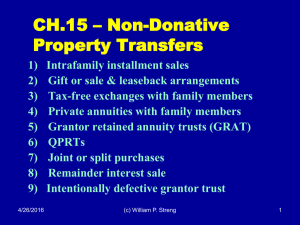CHAPTER NINE – Power of Appointment Planning
advertisement
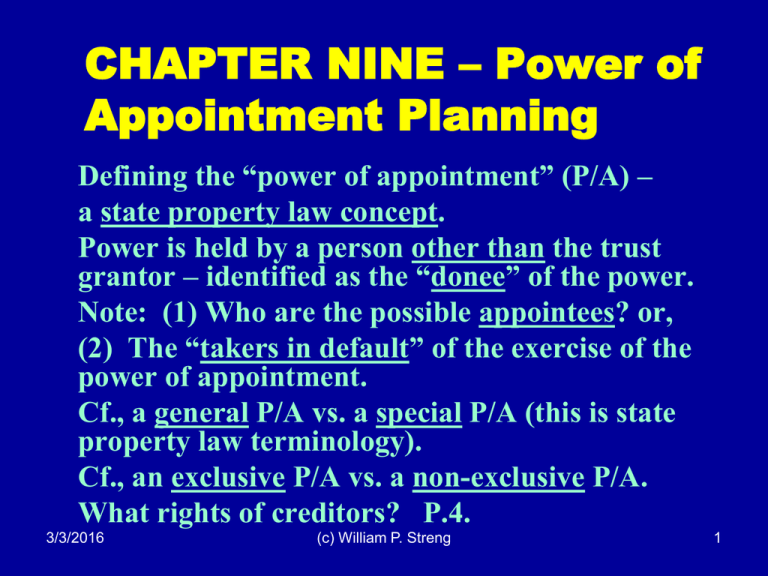
CHAPTER NINE – Power of Appointment Planning Defining the “power of appointment” (P/A) – a state property law concept. Power is held by a person other than the trust grantor – identified as the “donee” of the power. Note: (1) Who are the possible appointees? or, (2) The “takers in default” of the exercise of the power of appointment. Cf., a general P/A vs. a special P/A (this is state property law terminology). Cf., an exclusive P/A vs. a non-exclusive P/A. What rights of creditors? P.4. 3/3/2016 (c) William P. Streng 1 Federal Estate Tax Inclusion when P/A? Code §2041(a)(2) provides for inclusion in the gross estate of the property subject to a general P/A held by the decedent at death. Defining a general P/A – see TAM 200014002 (p.7): Decedent as co-trustee and life beneficiary; trustee could distribute income for “comfort and support” and discretion re corpus distributions. Are these powers too broad? But: What if state law prohibits the exercise of power to distribute corpus to herself (trustee). Consequently, no general P/A held by the cotrustee-beneficiary. 3/3/2016 (c) William P. Streng 2 Trustee Replacement Authority – p.9 Remember Estate of Wall and Rev. Rul. 95-58 re (non) inclusion when transfers to trust (& required independent corporate substitute). PLR 200024007, p. 10 - see Article Tenth – re no authority of the trustee to appoint to himself. Note Spouse as a member of a Committee to identify a replacement trustee. Held: not holding a general P/A if serving as a Committee member at death. 3/3/2016 (c) William P. Streng 3 What if an ambiguity re existence of general P/A? Possible judicial construction of the power as not being a “general” P/A (for state law purposes) but a “special” power? Possible reduction of a power from “general” to “non-general”: 1) Through judicial reformation 2) As permitted under the trust instrument? Consider the application of § 2514 (gift tax)? 3/3/2016 (c) William P. Streng 4 Estate Tax Apportionment p.14 Code §2207 mandates a proportionate allocation of the federal estate tax cost to property included because the decedent at death holds a general P/A. P/A assets not (ordinarily) in the probate estate. How negate the applicability of this tax apportionment rule, if desired? See Code §2207 providing for allocation “unless the decedent directs otherwise in his will …” 3/3/2016 (c) William P. Streng 5 “Ascertainable Standard” Exception p.13 §2041(b)(1)(A) – exception from P/A estate tax inclusion when the power over property is limited by an “ascertainable standard.” Rev. Rul. 78-398, p. 14 – the income beneficiary, as the sole trustee, has a power to apply corpus for beneficiary’s (i.e., his/her own) benefit. But – limited to “maintenance and medical care” and determined to be an “ascertainable standard.” Not a general P/A. See Notice 2008-63 (p. 16) re “private trust company” (PTC) usage as the trustee – not alone causing estate tax inclusion. 3/3/2016 (c) William P. Streng 6 What is an “Ascertainable Standard”? See Reg. §20.2041-1(c)(2). Rev. Rul. 77-60, p.16 – trust provides a power to invade corpus “to continue the donee’s accustomed standard of living.” The test is the “measure of control” over the property (p.16); i.e., is control restricted by “definite bounds”? Not here and, therefore, not an “ascertainable standard.” Requirement of acting in “good faith” is not relevant for this determination. 3/3/2016 (c) William P. Streng 7 Vissering case & state law concepts p.18 Did the decedent possess a general P/A? -Trust agreement under Florida law. -Resident in New Mexico at death. -Decedent co-trustee of deceased spouse’s trust. -Decedent mentally incapacitated. -Standard (?) for distribution: “continued comfort, support, maintenance, or education” of the beneficiary, p. 19. -State law (Florida) determines the scope of this power. Use “Certification”? P.26 -Remember the Bosch case (noted at p.22) deferring to state (c) property/trust law. 3/3/2016 William P. Streng 8 State law concepts Texas statute p.18, FN Texas Property Code § 113.029(b)(1) that – unless trust terms require otherwise – a trustee’s power to make a discretionary distribution to the trustee is subject to a health, education, support or maintenance “ascertainable standard” (i.e., within the meaning of Code §2041(b)(1)(A). 3/3/2016 (c) William P. Streng 9 Adverse Party Exception p. 27 Code §2041(b)(1)(c)(ii) – not a general P/A where exercise only with another person having a substantial interest in the property. Note the Vissering case – the bank was not adverse, p.20. Why? Rev. Rul. 77-158, p. 27 – here three trustees could distribute, including to themselves & therefore, treated as each owning a 1/3 interest – majority vote, not unanimity required. Cf., “distribution committee” issues, p. 28 3/3/2016 (c) William P. Streng 10 The “5 or 5” Power Exception p.29 Basic rules: (1) a “release” of a power is a “transfer,” and (2) a “lapse” of a power is a “release” (which, per (1) is, therefore, a transfer for estate tax purposes). See Code §2041(b)(2) – a lapse is treated as a release & treated as a transfer (for Code §20362038 purposes) only if the property value for which the lapse occurs is greater than $5,000 or 5% of the trust corpus (e.g., $1 million trust corpus enables a $50,000 lapse power). 3/3/2016 (c) William P. Streng 11 Rev. Rul. 79-373 p.30 Life insurance & withdrawal powers includible in gross estate? Settlement options: income & withdrawal right. Not includible for prior lapsed powers – since not exceeding the “5,000 or 5%” limit (and, therefore, no §2036 gross estate inclusion). But, inclusion of the amount subject to the withdrawal power at the time of death. 3/3/2016 (c) William P. Streng 12 Kurz case re sequencing powers p.32 Spouse has rights under two trusts: (1) marital trust – she could withdraw all; and (2) family trust – she could withdraw 5% - if the marital trust is first exhausted. Was the 5% of the family trust includible in her estate – even though the marital trust was not exhausted? Yes, she could have exhausted the marital trust; therefore, can not sequence multiple trusts to frustrate inclusion for the 5% amount. 3/3/2016 (c) William P. Streng 13 “5 or 5” Power and the Annual Donee Exclusion Code §2514(b) - exercise or release of a general P/A is a gift. Code §2514(e) – exception for “5 or 5” power lapse. Only one lapse per year – whether multiple gifts or multiple trusts. Amount transferred – reduced by income interest component. Code §2514(e) - & annual donee exclusion? Rev. Rul. 85-88, p. 35, re successive lapses of non-cumulative powers to withdraw. 3/3/2016 (c) William P. Streng 14 Income Tax Treatment when P/A - §678 The holder of the power is treated as the owner of the trust property (and, therefore, the trust income) for federal income tax purposes. Note: Rev. Rul. 67-241, p. 38 PLR 200022035, p.39: donee of the power who does not exercise is treated as making a partial release and treated as a partial owner of the trust for income tax purposes. 3/3/2016 (c) William P. Streng 15 Donee’s E&G Tax Considerations p.41 Rev. Rul. 79-327, p. 42, gift completed under Code §2511 – when (1) An exercise of a special power of appointment occurs, and (2) The individual possessed an income interest in the trust property for life (thereby terminating this life interest). 3/3/2016 (c) William P. Streng 16 PLR 201550011 p. 44 Comprehensive example of trust structuring. 3/3/2016 (c) William P. Streng 17 WWWWW wwww 3/3/2016 (c) William P. Streng 18
